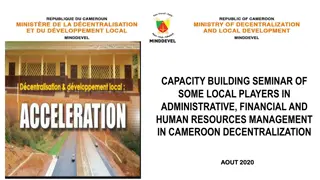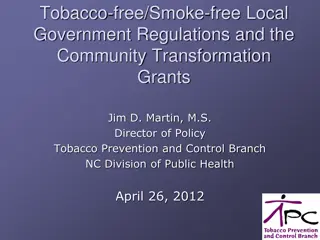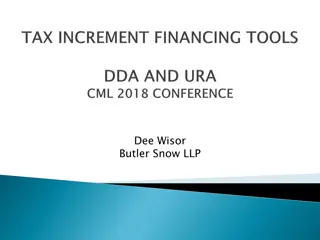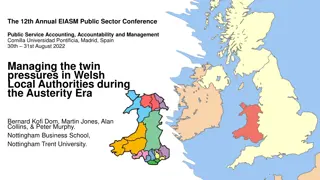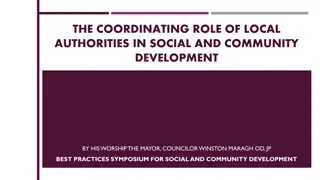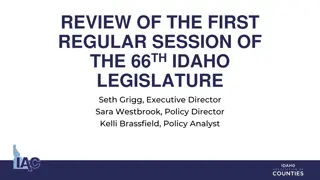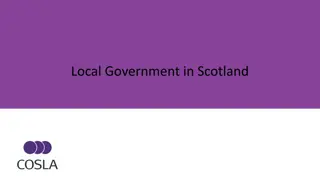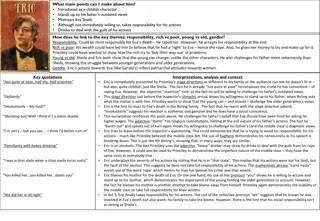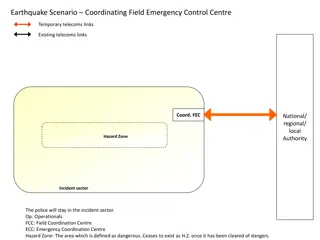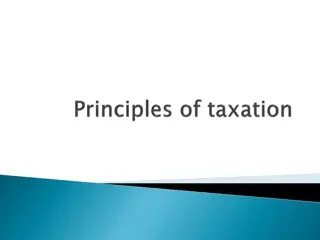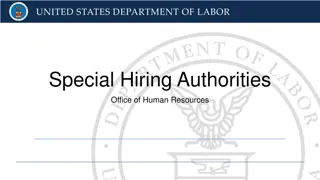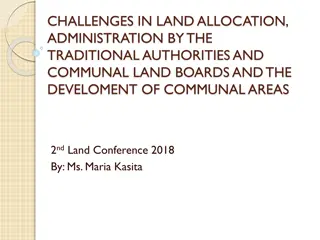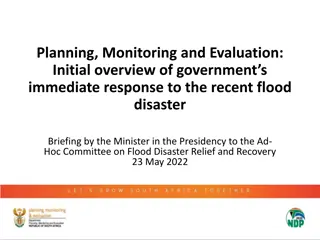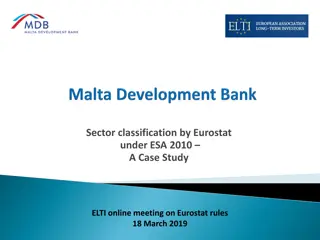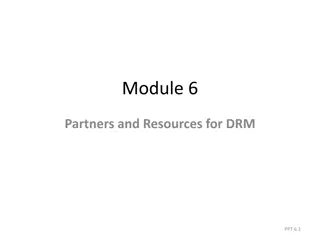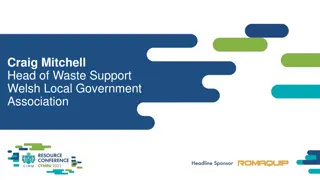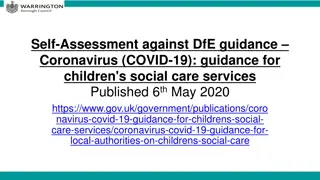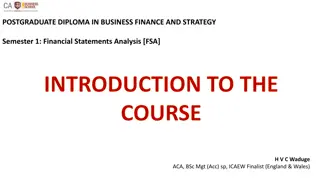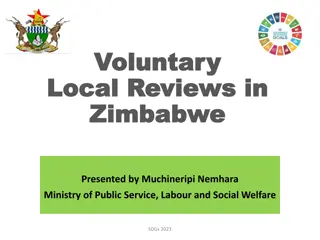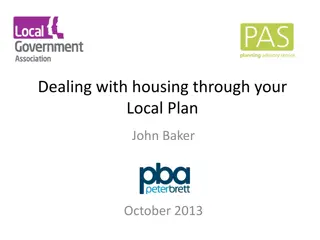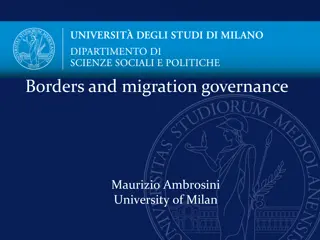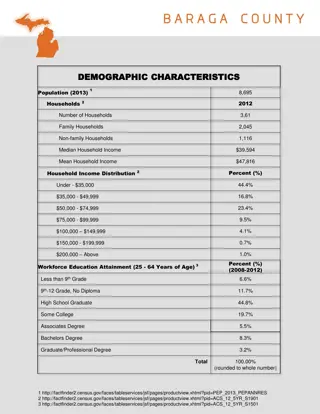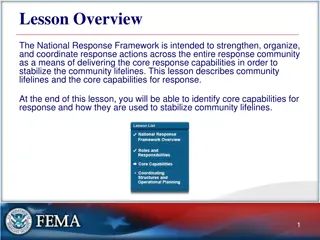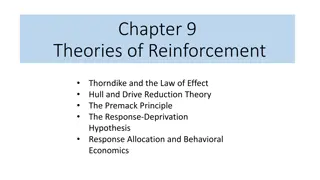Government Response to Financial Failings in UK Local Authorities
Professor Pete Murphy from Nottingham Business School discusses how the UK government intervenes or monitors financial, service, and corporate failings in local authorities. The history of financial irregularities, legislative basis, and intervention regimes are highlighted, showing the evolution of responses from pre-1997 to present-day practices.
Download Presentation

Please find below an Image/Link to download the presentation.
The content on the website is provided AS IS for your information and personal use only. It may not be sold, licensed, or shared on other websites without obtaining consent from the author. Download presentation by click this link. If you encounter any issues during the download, it is possible that the publisher has removed the file from their server.
E N D
Presentation Transcript
IRSPM Intervention or Monitoring: How the government responds to financial, service and corporate failings in local authorities in the UK Professor Pete Murphy Nottingham Business School Nottingham Trent University
Putting local government financial failure in context national bankruptcies Legal Context: Local Public Entities in Distress (Coordes, Marique & Vacarri, INSOL 2022) Portugal Ireland Greece and Spain in 2009 (Troika interventions) EY Porto Rica Case Study 2017-2022 Puerto Rico Financial Turnaround By Rannph irt anaithnid- Own work, CC BY-SA 3.0, https://commons.wikimedia.org/w/index.php?curid =10200348Portugal, Ireland Greece Spain (PIGS) intervention
UK Historical Antecedents Financial Irregularities Internal and External Audit, (Independent Auditors and District Audit established in 1868), Audit Commission in 1983. Public Interest Reports (PIRs), Corporate Failures and near misses e.g., Rate capping rebellion in 1985 LB Hammersmith and Fulham 1982 (Ultra-Vires speculating on stock market) Islandic Banks (108 Local Authorities lost 1billion in 2008) Service Scandals and Corporate Failures , External Service Inspections (HMI Constabulary 1856,) Performance Commission 1983) and Improvement and Development Agency Peer reviews (1998). Schools 1839, Audit HMI (Audit
UK Legislative basis The Local Government Act 1999 introduced The duty to achieve Best Value A new requirement to facilitate the continuous improvement of all services and activities. External Best Value Inspections Interventions (following service and corporate failings) were piloted in 2002, a number were challenged under Judicial Review, but all challenges failed. Local Government Act 2003 (Part 8 sections 99 and 100) clarified both performance categories and the exercise of powers in relation to performance. All subsequent interventions have been based on a failure to achieve or be achieving Best Value. In July 2023 the government issued a consultation on Best Value, Standards and Intervention really an ex-post facto tidying up exercise.
4 previous distinguishable regimes/periods Pre-1997 - External Audit, Public Interest Reports and External service inspections of some LA services (Schools, Police and Social Services partial coverage with weak intervention powers. 1997-2010. Best Value, Comprehensive Performance Assessments. Co-ordinated by Audit Commission. Inspection covered all services and activities 3 pilots, and the first CPA results led to 13 new cases of intervention (in addition to the 3 pilots). 2010-2018. Audit Commission abolished, sector led improvement meant inspections were limited, despite strong intervention powers they were triggered by service scandals (Doncaster 2010, Rochdale 2011, Birmingham 2014, Rotherham 2014, Tower, Kensington & Chelsea 2017). 2018-2023. Limited inspections, strong intervention powers but used almost entirely for financial issues. Now only a partial and weak evidence base for service or non-financial intervention and 144 notices. Northamptonshire, Nottingham, Croydon, Slough, Thurrock, Woking, Northumberland, Birmingham with others reported to be considering 114s e.g., Middlesborough, Coventry, Somerset, Hasting). DLUHC Select Committee reported a systemic financial problem
Intervention approach under Best Value/CPA. The nature and philosophy behind the government s response strategic turnaround and recovery we will not reward failure, but we will support progress and success . It dealt with both corporate and service performance as well as governance, managerial and community leadership inadequacies with all-party support and party-political involvement (a collaborative approach). Included formal intervention and more informal monitoring with an excellent and improving evidence base (147 National reports and 7000+ inspections) which also became an effective early warning system for. Criteria for coming out of intervention clear bespoke benchmarks for individual cases and robust positive trajectory of improvement, validated though performance indicators and inspection reports.
After 2010 a sea change in policy The UK government and England reverted to New Public Management and policies aiming to Reduce the (local) state and particularly thelocal state The Coalition government in England abolished the Audit Commission, abandoned external assessments and inspections, (replaced with sector-led improvement), and significantly reduced the data information and evidence base available. Local Audit and Accountability Act 2014 outsourced Local Public Audit, changed the audit regime, reduced the scope of audit and reporting requirements for Local Public Audit. (Short-term purely financial reports). The devolved administrations in Scotland and Wales continued developing their response based upon the principles of Public Value and New Public Governance but were subject to UK wide austerity policies
This created long term structural issues Long-term reductions in central government support funding and caps on LAs raising council tax Increasing demand for social care, housing and welfare services (Dom 2023) because of austerity-localism, demographic changes, and increasing inequalities. Reductions in strength, quality and quantity of scrutiny e.g., only 9% of Local Public Audits signed formally off on time by September 2023 (for 40 years it was 100%) CIPFA Financial Resilience Index, and EY Section 151 Confidence Barometer, ( 72% of LAs are reducing funding in areas that are long term priorities, to meet short term budget pressures . EY 2023)
By 2018 it is clear .. more section 114 notices! In 2019 Sir Tony Redmond was appointed to produce an Independent Review into the Oversight of Local Audit and the Transparency of Local Authority Financial Reporting. Not fit for purpose In his evidence to the 2019 Spending Review inquiry, Sir Amyas Morse of NAO said a combination of reduced funding and higher demand has meant that a growing number of authorities have not managed within their service budgets and have relied on reserves to balance their books. These trends are not financially sustainable over the medium term Institute for Fiscal Studies (Ogden & Phillips 2020) updated and assessed the 2021/22 Local Government Finance Statement (LGFS) plans for both core funding and top-ups for ongoing COVID-19 related costs. In simple terms, all these sources indicate that the scale of the problem is significant, will continue to increase and the number of councils under financial stress will almost inevitably rise (2023 DLUC Select Committee Chair called it a systemic problem).
What are Section 114 Notices UK local authorities cannot go bankrupt. A section 114 notice indicates that, in the opinion of the Statutory Section 151 officer the council s forecast income is insufficient to meet its forecast expenditure in the next financial year and it can see no way of doing so. The current and forecast allocations for service delivery and other activity must continue to meet the statutory requirements needed to attain Best Value Not all 114s have led to monitoring or intervention. Between 2020 and 2024 government provided some temporary additional funding to all LAs in the UK for Covid-related impacts as the number of reports about possible 114s increased.
Birmingham City Council S114 Report (5thSept) (International News) The Section 151 Officer is of the opinion that: a. The Council is currently in a negative General Fund position. That is because of the cost of providing for Equal Pay claims, that the Council is now legally obligated to recognise, will result in exceeding the financial resources available to the Council. This means that spend due within that period exceeded the financial resources available to the Council in that same period. b. The Council has insufficient resources to meet that expenditure and the Council is not currently able to agree a solution that will allow suitable funding or financing to be obtained for this liability
Long-term background Long-term real fall in LAs Spending power (31%) due to reductions in central government grants Demand for services increasing as a result of demographic changes, inequality and austerity particularly Adult and Childrens Social Care. More recently - rises in inflation Birmingham City Council Trigger The background and the trigger On 5 September 2023, BCC issued a section 114 notice as the council anticipated a gap of 87 million between income and expenditure for the (current) 2023/24 financial year. In addition to this gap, the council estimated that it would have to pay 650 million to 760 million in backdated equal pay claims, following a court judgment in 2012.
On 15thSept govt appoints external commissioners 6 Commissioners! led by Max Caller with 2 political advisers to support the BCC leaders as they take difficult decisions Leader of the Council Cllr Cotton and CEO Deborah Cadman (both relatively new to their positions) vowed to work constructively and collaboratively with the commissioners Response required from BCC Sales of Assets Raising the level of Council Tax (10% agreed for next two years) Reductions in services or the quality of statutory services. Withdrawal of discretionary services (and potentially statutory services) Possible dismissal of Political Leaders and Senior Officials and as the last resort borrowing from Central Government.
2020 Section 114 relating to the arms length company Robin Hood Energy - an Improvement and Assurance Board, and Recovery and Improvement Plan established in 2021. Nottingham City Council In December 2021, the council itself found acknowledged unlawful accounting practices associated with its ring-fenced Housing Revenue Account going back six years and totalling 15.86m. (DLUHC threatened commissioners) 29 November 2023, the Section 151 officer issued another 114 notice but this time it was long-term structural factors Children and Adults Social Care costs, rising homelessness presentations, and inflation a rising tide of costs. The background and the trigger Government: there has been a distinct lack of urgency in tackling the necessary change . Need to increase the pace of change in governance, finance, transformation, corporate planning, companies and workforce culture and performance outcomes. New Commissioners
Evidence: extensive Evidence: robust but . Scope: broad - wicked problems and service delivery Scope: narrow essentially financial Comparison cases under the two systems and responses Objective: balancing the budget Objectives: organisational recovery Emphasis: coercion Emphasis: collaboration Focus: reducing services and transferring assets Focus: organisational development Likelihood of success? We know these were successful
Two barriers to success? The governments future 5- year spending plans 2024- 2029 outlined in Autumn Statement in Nov 2023 The rising level of Local Authority Debt
Moodys (2023) Top 20 councils debt. Local Authority Borrowing Ratio Local Authority Borrowing Ratio to Income to Income Spelthorne 1.1bn 87 Brentwood 226 Woking 2.0bn 62 Mole Valley 103 Eastleigh 522m 41 East Hampshire 120 Runnymede 643m 23 Thurrock 1.5bn Worthing 2014m 14 Adur 165m Surry Heath 170m 14 Epsom and Ewell 64m Rushmoor 120m 11 Broxbourne 58m Cherwell 188m 10 Guildford 295m Uttlesford 302m 10 Chorley 78m Warrington 1.8bn 10 Warwick 268m. Table 3. Top 20 English councils with high levels of debt for their size
Birmingham and Nottinghams Section 114s attracted international publicity but this didn t Exceptional financial support for local authorities (Capitalisations) 2020-21 9 78.2m Bexley, Croydon, Eastbourne, Lambeth (100m in 2017/18), Luton, Nottingham, Peterborough, Redcar & Cleveland, Wirral 2021-22 4 63.3m Copeland, Croydon, Eastbourne, (Bexley, Luton, Nottingham and Peterborough withdrew requests ) 2022-23 4 356.5m Copeland, Croydon, Kensington & Chelsea, Slough (2018-23) (Bournemouth withdrew request ) 2023-24 19 ,3051.bn Birmingham (2020-24) Bradford (2022-24) Cheshire (East 2022-24) Croydon, Cumberland, Eastbourne (2022-24), Havering, Medway, Middlesborough, N Northants, Nottingham, Plymouth, Slough, Somerset, Southampton, Stoke-on- Trent, Thurrock, W Northants, Woking.
Audit Commission run down and abolished 2010-2015 Improvement and Development Agency closed 2010 Government Regional Offices closed April 2011. What happened to Improvement, Support and Infrastructure? Local Audit regime privatised and weakened by Local Audit and Accountability Act 2014 Distributional model of LG funding support frozen Financial support 2010-2023 reduced by 30%-40% in real terms by successive Spending Reviews. Dec 2022 announcement that funding review and reset of business rates retention will not take place for at least two years.
Some interesting aspects Austerity has applied to all LAs in the UK but there have been no section 114 notices in Scotland, Wales or Northern Ireland (yet!) The first step in any improvement journey is to cease denial of the problem/causes and work with the intervention board. In Birmingham there is unlikely to be a local government re- organisation (as in Northamptonshire or Cumbria). July 2023, the Office for Local Government (Oflog), a new local government information and performance body for England was announced inter alia. to improve the performance statistics. As a result of recent cases Sector-led improvement is likely to be toughened but should be replaced.
Questions? Contact: peter.murphy@ntu.ac.uk


